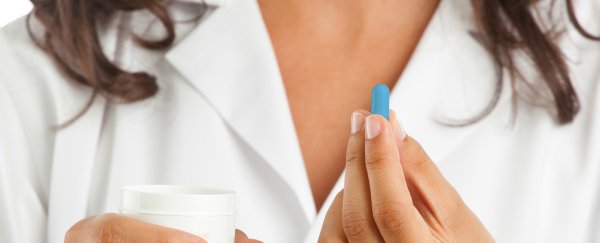The US food and drug administration (FDA) just agreed to back an experimental drug that's being called 'female Viagra' and is designed to increase a woman's sexual desire.
The FDA panel voted 18-6 in favour of approving the pill, called flibanserin, so long as its manufacturer makes a plan to limit its safety risks. It's a far cry from female Viagra, however.
How it works
Unlike Viagra, which helps men get and keep an erection by directing blood flow to that area of the body, this new drug, called flibanserin, is designed to help boost a woman's psychological desire for sex. In order to do that, this drug is taken daily and, over time, can affect the levels of certain chemicals in the brain.
"It's beyond ridiculous that this is being called female Viagra," Bat Sheva Marcus, a sexual dysfunction specialist at the Medical Centre for Female Sexuality in New York, told Business Insider. "This isn't about blood flow. It's got nothing to do with blood flow."
Pfizer, the makers of Viagra, tried marketing plain old male Viagra to women in 2004. It failed. The drug increased blood flow to women's genitals, but that had zero effect on their desire for sex.
That's where flibanserin is different.
Flibanserin targets two neurotransmitters in the brain that can help inspire sexual desire. The first is dopamine, which helps control the brain's reward and pleasure centres and could help drive up our interest in sex. The second is norepinephrine, which affects parts of the brain that control our attention and our response to things in our environment and could help direct our attention to a sexual partner.
Many women - some studies estimate this number is as high as one-third of all adult women - suffer from a condition known as female hypoactive sexual desire disorder (HSDD). The essential feature of HSDD in women is a lack of desire for sex that causes distress. According to Marcus, women with HSDD still enjoy sex when they have it, but the inspiration to have it in the first place simply isn't there.
"I see this all the time where a woman, she enjoys sex and gets aroused and orgasms, but she absolutely just doesn't want it anymore - she's just not interested," said Marcus. "It's something that's going on in the brain."
This drug, which is supposed to be taken daily, would ideally target a mix of neurotransmitters so as to give that desire a boost. "It's trying to change the parts of the brain that don't light up, the ones that aren't responding," said Marcus.
How well does it work?
People aren't sure how well flibanserin works just yet. Although it's been through several trials, its benefits are still controversial.
For one thing, flibanserin comes with side effects, just as any drug would. These side effects include fainting and drowsiness, especially if taken with alcohol. Some have said these aren't severe enough to merit blocking it, while others say there could be unforeseen problems that haven't yet been accounted for. And there are concerns about potential problems with alcohol given how much the average American drinks.
Plus, its success is somewhat disputed.
Although it was effective in trials in raising the number of times a woman has satisfying sex (which the scientists label "satisfying sexual episodes", or SSEs) it didn't improve sexual desire - the very thing the drug was designed to do.
Women in the trials taking flibanserin saw an increase in the number of times they had satisfying sex from roughly 2.8 times per month to an average of 4.5 times per month, an increase of about 1.7 times.
Here's the problem: Women taking just a placebo in drug trials had more SSEs too, albeit by a slightly smaller number. Women taking a placebo saw their number of SSEs went up from an average of 2.7 per month to 3.7, an increase of 1.
In other words, controlling for the placebo effect, flibanserin's effectiveness amounted to roughly one extra episode of satisfying sex each month, reports David Kroll in Forbes. This was likely one of the reasons the FDA has rejected pharma companies' petitions for it twice, according to Fierce Biotech.
Yet the company making the drug, Sprout Pharmaceuticals, says this is enough of an increase to make it available to women.
And today, the FDA appeared to agree.
"It's clear to me that there were very consistent benefits in measures we understand for some portion of women," and no benefits for others, advisory committee member Kevin Weinfurt said.
This article was originally published by Business Insider.
More from Business Insider:
